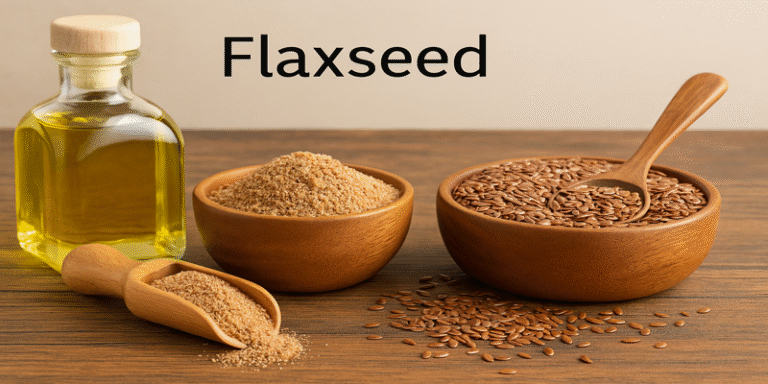Flaxseed (Linum usitatissimum) has been cultivated for centuries and has re-emerged as a functional food with proven health benefits. Rich in alpha-linolenic acid (ALA), lignans, fibre, and protein, flaxseed offers protective effects against cardiovascular disease, inflammation, hormonal imbalances, and metabolic disorders. As both a nutrient-dense food and a versatile kitchen ingredient, flaxseed can be easily included in day-to-day diets, making it valuable for both preventive nutrition and culinary innovation (Singh et al., 2011; Toure and Xueming, 2010).
1.0 Nutritional Composition of Flaxseed
Flaxseed contains approximately 41% fat, with over half being ALA, a plant-based omega-3 fatty acid. It also contains 28% dietary fibre and 20–25% protein, making it beneficial for cardiovascular, digestive, and metabolic health (Mueed et al., 2022; Rabetafika et al., 2011). Lignans such as secoisolariciresinol diglucoside (SDG), present in concentrations up to 1.5%, offer antioxidant and phytoestrogenic properties that may help regulate hormone metabolism (Toure and Xueming, 2010).
2.0 Health Benefits of Flaxseed
2.1 Cardiovascular and Metabolic Support
Flaxseed contributes to cardiovascular health through multiple mechanisms. Studies report significant reductions in blood pressure, LDL cholesterol, and triglycerides with daily flaxseed intake (Parikh et al., 2018). Furthermore, its soluble fibre content aids in glycaemic control, making it beneficial for individuals with type 2 diabetes (Nowak and Jeziorek, 2023).
2.2 Anti-Inflammatory and Antioxidant Activity
The antioxidant activity of flaxseed is due to its lignans and ALA, which neutralise oxidative stress and reduce inflammation—key drivers in cancer, atherosclerosis, and neurodegenerative diseases (Ganorkar and Jain, 2013). SDG has been shown to suppress inflammatory markers like TNF-α and IL-6 (Sahoo et al., 2015).
2.3 Hormonal Health
Due to their structural similarity to oestrogens, flaxseed lignans may help balance hormonal fluctuations. Research suggests benefits in menstrual regulation, menopause symptom management, and possibly reduced risks of hormone-sensitive cancers (Cardoso Carraro et al., 2012). However, caution is advised for individuals with hormone-related conditions.
2.4 Digestive Health
Flaxseed is rich in mucilage and insoluble fibre, which improve bowel regularity and support gut microbiota. Soaked flaxseeds have shown to enhance the production of butyrate, a short-chain fatty acid beneficial for colon health (Mueed et al., 2022; Tarpila et al., 2005).
3.0 Practical Household Uses of Flaxseed
Beyond its health benefits, flaxseed is highly adaptable in the kitchen. Its various forms—ground, whole, oil—make it suitable for both cooked and raw applications.
3.1 Ground Flaxseed for Maximum Absorption
Grinding flaxseed improves bioavailability of ALA and lignans that are otherwise locked within the seed’s hard outer shell (Patade et al., 2014). Common uses include:
- Breakfast cereals: Stir into oats or muesli.
- Smoothies: Adds body and nutrition.
- Yoghurt and kefir: Enhances consistency and taste.
- Baking: Replace part of flour in pancakes or muffins (Ganorkar and Jain, 2013).
- Soups and stews: Used as a natural thickener.
Regular consumption of 10–20g/day supports cholesterol reduction and glycaemic control (Sierra et al., 2015).
3.2 Whole Flaxseed for Texture and Fibre
Though less digestible unless chewed well, whole flaxseeds still provide bulk and aid digestion.
- Salad topping: Adds crunch and fibre.
- Grain dishes: Sprinkle over rice or quinoa.
- Granola and trail mix: Combines well with nuts and dried fruits.
- Toasted snack: Improves flavour and digestibility (Ayelign and Alemu, 2016).
3.3 Flax “Egg” for Vegan Baking
When combined with water, flaxseed forms a gel ideal for egg substitution.
- Recipe: Mix 1 tablespoon of ground flaxseed with 3 tablespoons of water. Let sit for 10 minutes.
- Used in: Cookies, brownies, muffins, pancakes.
This method provides moisture and binding without cholesterol (Wong et al., 2017).
3.4 Flaxseed Oil for Omega-3 Intake
Cold-pressed flaxseed oil is a concentrated source of ALA, offering a vegan alternative to fish oil. However, it is not heat-stable and should only be used cold:
- Salad dressings: Blend with vinegar or citrus.
- Smoothies: Add 1 teaspoon.
- Dips: Use in hummus or pesto.
One tablespoon provides ~7g ALA, enough to meet daily omega-3 needs (Nowak and Jeziorek, 2023).
3.5 Soaked Flaxseed Tonic
Soaking whole flaxseed in water overnight produces a mucilaginous gel beneficial for gut health and satiety.
- Recipe: Soak 1 tablespoon flaxseed in 200 ml of water. Drink on an empty stomach in the morning.
- Helps manage constipation, IBS symptoms, and appetite control (Tarpila et al., 2005).
4.0 Storage and Safety Tips
- Dosage: 1–2 tablespoons of ground flaxseed daily is generally safe.
- Storage: Keep ground flaxseed and oil in an airtight container in the fridge to prevent rancidity.
- Medication Interactions: Flaxseed may interfere with absorption of certain drugs; seek medical advice if taking blood thinners or hormone therapies (Cardoso Carraro et al., 2012).
- Detoxification: Cooking or baking neutralises naturally occurring cyanogenic glycosides in flaxseed (Ganorkar and Jain, 2013).
Flaxseed is a nutrient-dense superfood with versatile applications in household diets. Whether used to enhance breakfast cereals, baked goods, or smoothies, or as a vegan egg alternative or omega-3 supplement, flaxseed offers substantial health benefits. With strong scientific backing, it serves as both a preventive and functional component of nutrition. Its simple incorporation into daily meals makes flaxseed an accessible and powerful tool for enhancing overall health and wellbeing.
References
Ayelign, A. and Alemu, T. (2016) ‘The Functional Nutrients of Flaxseed and Their Effect on Human Health: A Review’, European Journal of Nutrition and Food Safety, 6(3), pp. 111–122.
Cardoso Carraro, J.C. et al. (2012) ‘Flaxseed and human health: Reviewing benefits and adverse effects’, Food Reviews International, 28(3), pp. 203–215. DOI:10.1080/87559129.2011.595025
Ganorkar, P.M. and Jain, R.K. (2013) ‘Flaxseed—A Nutritional Punch’, International Food Research Journal, 20(2), pp. 519–525.
Mueed, A. et al. (2022) ‘Flaxseed bioactive compounds: Chemical composition, functional properties, food applications and health benefits-related gut microbes’, Foods, 11(20), 3307. DOI:10.3390/foods11203307
Nowak, W. and Jeziorek, M. (2023) ‘The Role of Flaxseed in Improving Human Health’, Healthcare, 11(3), 395. DOI:10.3390/healthcare11030395
Parikh, M. et al. (2018) ‘Flaxseed: Its bioactive components and their cardiovascular benefits’, American Journal of Physiology, 314(2), H146–H159. DOI:10.1152/ajpheart.00400.2017
Patade, V.Y. et al. (2014) ‘Improved lipid profile and glycaemic control by ground flaxseed supplementation in type 2 diabetics’, Journal of Diabetes and Metabolic Disorders, 13(1), p. 14.
Rabetafika, H.N. et al. (2011) ‘Flaxseed proteins: food uses and health benefits’, International Journal of Food Science & Technology, 46(2), pp. 221–228. DOI:10.1111/j.1365-2621.2010.02477.x.
Sierra, S. et al. (2015) ‘Effects of flaxseed and its components on lipid profile, glycaemic control, and insulin sensitivity: a systematic review’, Clinical Nutrition, 34(2), pp. 117–122.
Singh, K.K. et al. (2011) ‘Flaxseed: a potential source of food, feed and fibre’, Critical Reviews in Food Science and Nutrition, 51(3), pp. 210–222. DOI:10.1080/10408390903537241
Tarpila, A. et al. (2005) ‘The effect of flaxseed supplementation on digestive health: a review’, World Journal of Gastroenterology, 11(33), pp. 5250–5255.
Toure, A. and Xueming, X. (2010) ‘Flaxseed lignans: Source, biosynthesis, metabolism, antioxidant activity, and health benefits’, Comprehensive Reviews in Food Science and Food Safety, 9(3), pp. 261–269.













